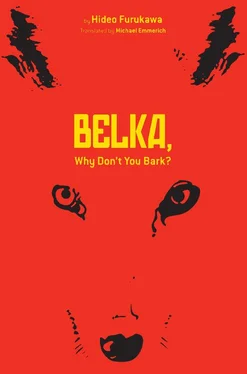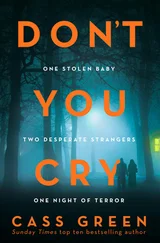“Even the bones?” the old man had asked the corpse. “The skull? You would go that far?”
And the corpse answered, Yes .
So the old man began working for cash.
He killed a punk with a tattoo on his right arm that glorified America. He killed a prostitute with a pro-democratic slogan tattooed on her left arm. People asked him to do it, and he did it. He killed bureaucrats. He killed police officers. Sometimes he charged one hundred rubles, sometimes he charged one hundred dollars. When he returned to his apartment at night, he talked to the globe. I will protect you, he said. Because you’re the perfect match for me, he said, I will protect you. Yes, I am talking to you, the skull of a dog whose destiny it was to die in space, sent up with no hope that she would return, sent up to be killed, to continue wheeling around the earth, in orbit, you, skull of a murdered hero.
Who will protect you? I am the only one. I will protect you.
One day, the old man had a guest. An invited guest. The first guest this apartment had seen. A Slavic man, his head balding. He stroked the globe, humming some sort of melody.
A military march? the old man asked.
The middle-aged man looked up. Ah, the song. I didn’t realize.
How is your mother?
She’s fine. She’s still grateful to you, Director. For those… splendid last days.
I am no longer the Director.
Sorry. We’re so used to calling you that at home. My father, and me.
Both my men.
The only ones in the unit. Father and son, wearing the same insignia.
And how are your sisters?
They’re fine too. They’ve started speaking a bit, two or three words a year.
Your family… did not dissolve.
I beg your pardon?
The Soviet Family Code predicted the dissolution of the family. In 1926.
As far as we’re concerned, you’re our father now.
Even though we are not related?
That’s right.
That is a good family. Except that… I am gone.
You’re gone?
The old mad nodded, then asked one last question.
And how are the dogs?
The dogs are well, the guest answered.
That afternoon, the tension that had been building between the mafia organizations throughout the city finally erupted. According to the radio. The television reported that the gangs had declared war on each other. The authorities issued a statement calling for residents of the city to remain indoors. Newspaper reporters rushed hither and yon. The two news agencies, Interfax News and the Russia News Service, transmitted up-to-the-minute reports to every corner of the Eurasian continent. And to the New World. The extraordinary number of dogs on the streets that day was not considered newsworthy. Reports of abnormal sightings were treated as mere blather, vaguely occult in nature, and ignored. Ordinarily one would have expected the tabloids to jump at this kind of thing, but they didn’t that day, or the next, or later on. This, too, had been carefully factored into the calculations—the kinds of stories the mass media inevitably focus on, their blind spots. Elaborate preparations had been under way for months in this city, laid on the foundations of hundreds of casualties.
The dogs were rebelling, but their rebellion was invisible.
Ordinary citizens noticed the disorder but assumed it was just the usual gang violence, nothing they should be concerned about.
It helped to have the chaos noticed. Because the media fanned the flames. And when the flames had been fanned hard enough, people snapped. Finally, the incident expanded to encompass the entire nation.
Certain functions of the city were paralyzed, but the mass transit system was still in order, more or less. The airports were fine. The trains were running. The planes and trains carried “support troops” to the Russian Far East. Naturally, these newcomers got into arguments with the police at the entrance to the city. Not the dogs, though. By afternoon, the dogs were already lying low.
The dogs were guerrillas. They served no government. But they did have rules. Their fighting techniques were as refined as those of any regular army.
But they were guerrillas. They conducted only surprise attacks.
The dogs seized control of several areas. Areas dotted with mafia facilities, the scenes of deaths as yet unknown to the authorities. A printing house that produced counterfeit dollars. A vast underground factory that manufactured counterfeit brand items. A warehouse holding mountains of drugs (these were real, not counterfeit). Another warehouse full of contraband antiquities. Yet another warehouse holding concentrated uranium and disassembled nuclear warheads destined to be smuggled out of the country. The dogs were waiting. Because sooner or later, someone would come to steal these items back. Or some new players would come to make off with them, make them their own. Or maybe someone would simply come looking.
Pretty much anyone who came along was killed.
Four PM. A middle-aged man was directing the dogs. A balding Slavic man. He gave signals to the dogs, eliminated everyone who approached. The dogs’ unusual fighting techniques had been used before, in the 1980s, somewhere in Afghanistan. They had been used, as well, west of the line that divided Europe, to assassinate a senior NATO officer. The middle-aged man hummed loudly as he led his lightning squad into battle. He had a submachine gun that he used to cover the dogs’ tails, as it were, very precisely. He was the man Strelka called Opera.
At 4:30 PM, still humming, he mowed down four mafia fighters without bothering to send in the dogs. A bit of rapid-fire action was all it took.
The sun had already sunk well below the horizon.
The dogs remained invisible to human eyes.
Other dogs saw them, however. There was barking in the distance. Distant barks answered by distant barks—a conversation. Someone had been cutting the chains on pet dogs’ collars. In the forests outside the city, hunters’ dogs disappeared. Wild dogs ran through the city streets as if gone mad. Slowly, little by little, something was happening. Little by little, one by one, the dogs were being freed. Various mafia were heading by land toward the Russian Far East. To join the conflict—to enlist in a war that was, they still believed, with other mafia. To steal the drugs that had been left behind, to play their part in what they still believed was a tug-of-war among different criminal organizations.
Mafia all across Russia watched the city very closely.
Here and there, gates were opened. Whole trains were bought. They would screech to a halt a mile short of the station, and dozens of men would descend. Counterfeit papers worked their magic in airports. Police squads that had set up inspection stations on the highway saluted as their old buddies, the mafia kingpins, passed in their motorcades: Welcome to the Far East!
Around midnight, the nature of the street fighting changed as a new strategy was introduced. Now the dogs were taking hostages. They no longer lunged at the throats of their targets but brought them back alive, as they had been commanded to do. They brought the hostages back, presented them to the old man.
First one.
Then another.
And another.
All night long.
Barks echoed back and forth across the city.
“I can prepare a table for us to negotiate at,” the old man said.
What is all this? the other man said. What the hell are these dogs?
“You remember 1812?” the old man asked.
Who are you? the other man asked. The head of their tribe?
“The Napoleonic Wars. You remember? You are a Russian, right? Or rather, you are a former Soviet? You must have learned your history. How that stupid French emperor marched into Moscow in 1812 with an enormous army, 110,000-men strong—marched into the capital, which the Russian army had decided, strategically, to give him. You remember what happened then?”
Читать дальше












